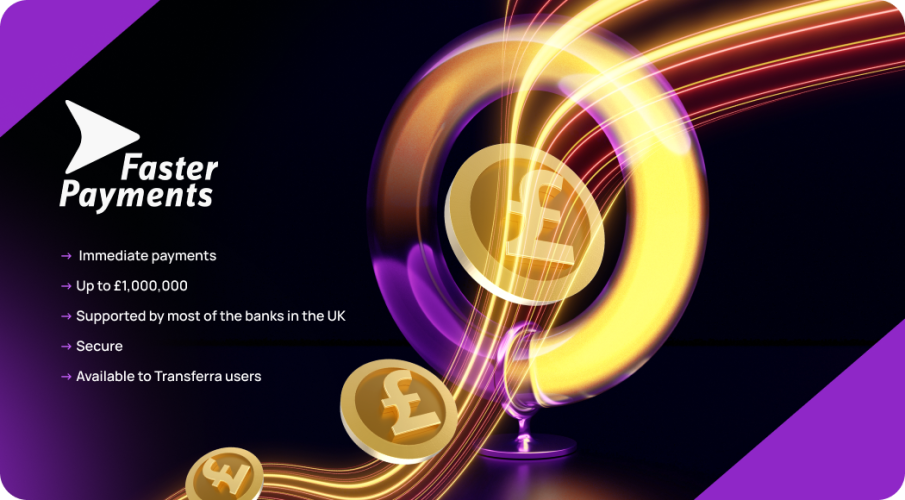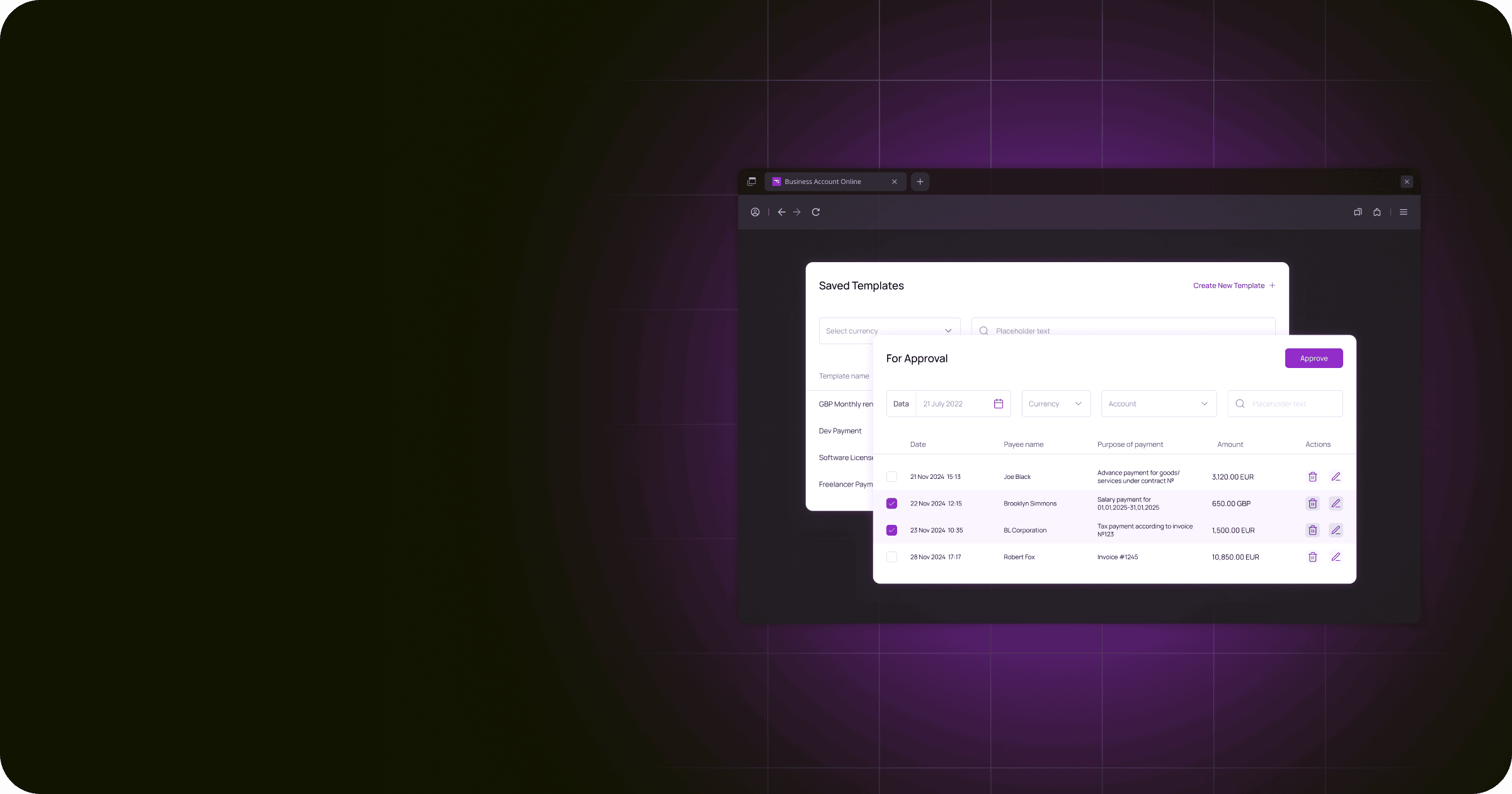What is a Faster Payment Service And How Does It Work?
Faster Payments are one of the wire transfer methods used for UK domestic payments. Here is everything you need to know about Faster Payments.
In the United Kingdom, Faster Payments have revolutionized the way money moves between individuals and businesses. The service has emerged as a game-changer, providing swift and convenient transactions that reshape the dynamics of commerce. In this article, we are going to cover everything you need to know about the Faster Payments scheme.
What Is a Faster Payment?
⠀⠀⠀⠀
As the term indicates, with Faster Payments in the UK, wire transfers in British pounds (GBP) are processed rapidly and deposited into the recipient’s account nearly immediately. It is owned and controlled by Pay.UK, the same firm that oversees BACS transfers and checks.
The system specifically supports GBP transactions. If you need to send funds in other currencies, such as euros, you would typically require a separate account, such as a euro business account, to facilitate those transactions efficiently. This ensures that currency conversions and cross-border transfers can be handled seamlessly.
The 2008 introduction of the Faster Payments Service (FPS) sought to reduce bank-to-bank transaction wait times for GBP instructions. The transactions may be processed in-branch, over the phone, via mobile banking, and on the bank’s website. The most common kind of Faster Payments is single instantaneous transfers that may be handled as single immediate payments 24 hours a day, seven days a week.
How Do Faster Payments Work?
This method is simple for consumers, but banks must do a large amount of administrative work to send the money.
There are four distinct Faster Payment alternatives.
These encompass:
- Instant and one-time transfers
- Instructions dependent on future events
- Permanent directions
- Direct corporate access payments
Future and current transfers are both one-time transactions. These may be accomplished using Internet banking, a mobile application, or a bank office. A single instantaneous payment will be delivered immediately and will appear in the recipient’s account within a few hours. It is possible to arrange forward-dated instructions to transfer money at a certain time and date.
When you send and receive Faster Payments, the following steps typically occur:
- Initiation, when you provide the necessary details, including the recipient’s account number and sort code, and the amount to be transferred. To be able to send Faster Payments, you need to open a GB IBAN account that supports GBP payments.
- Verification. Your bank verifies the request, ensuring that the necessary funds are available in the account and that the transaction meets any security requirements or fraud checks.
- The bank sends an instruction to the Faster Payment System.
- Routing. The system routes the instruction to the recipient’s bank. This is typically done using secure messaging protocols and standardized messaging formats to ensure interoperability between different institutions.
- Processing. Upon receiving the instruction, the recipient’s bank verifies the recipient’s account details, checks for any potential issues, and applies any necessary checks for fraud prevention or compliance with regulatory requirements.
- Clearing and Settlement. The bank debits the sender’s account and credits the recipient’s account and ensures that the transfer of funds is accurately recorded and reconciled.
How Long Do Faster Payments Take?
The name explains itself, they are instantaneous. Most of the time funds are deposited into the recipient’s account within several minutes. Sometimes money may take up to two hours to arrive. Nevertheless, the service helps to significantly reduce payment times.
What Is the Faster Payments Limit?
The transaction maximum is £1,000,000. There may be limits on some accounts for Starling clients. Instructions may be completed inside the app, and if they need further information to authorize the transfer, they will contact you there. Occasionally, you may be required to produce supporting documentation.
What Are the Different Types of Faster Payments?
There are four categories. These encompass:
- Single payments are often one-time transactions. This is the most frequent and always-available method.
- Forward-dated payments are likewise one-time transactions, but they are given and received on an agreed-upon date in the future. The most prevalent example is paying a phone bill using a debit card. These may be submitted at any time, although some firms will only accept payments on business days.
- A standing order is a scheduled instruction with a predetermined amount and date. They are often utilized for costs such as rent and bills. Payments via standing order are often only accepted during the week; if the due date comes on the weekend, the instruction will be processed the next working day.
⠀⠀⠀⠀ - The intended audience for payments for direct corporate access is businesses. These allow firms to transmit several instruction messages simultaneously. These methods are incompatible with Starling Bank.

Which Banks Are Direct Participants of Faster Payments?
The vast majority of British banks support them. However, some banks, building societies, and financial services firms are direct members of the Faster Payments Service, meaning they connect to the service without a third-party sponsor. Starling participates extensively in FPS.
The following parties have a direct investment in Faster Payments:
| The Access Bank UK | Danske Bank | Modulr | Square |
| Atom Bank | Ebury | Monzo | Starling Bank |
| Barclays | Elavon | Nationwide | Tandem |
| BFC Bank | HSBC | NatWest | Tesco Bank |
| Cashplus | HSBC UK | PayrNet | Wise |
| Citi | JP Morgan | PPS | TSB |
| Clear Bank | LHV | Prepaid Financial Services | Turkish Bank UK |
| Clydesdale Bank | Lloyds Bank | Revolut | Virgin Money |
| The co-operative Bank | Metro Bank | Santander | |
| CreDec | Mettle | Equals Money |
Are Faster Payments the Same As A Bank Transfer?
Yes, they are a type of bank transfer and they operate similarly to bank transfers. The words are often interchanged. BACS and CHAPS are additional formats for bank transfers.
Transaction Limits of Faster Payments
These may differ based on whether a transfer is made from a personal or commercial account. Each financial institution has its requirements for both sorts of transactions. The Faster Payments website provides listings of each bank’s transaction limitations for both business and personal transactions.
Faster Payments Cost
As of August 2022, over forty institutions are using the FPS. A fee will be assessed to business clients based on their usage and the pricing structure of their bank. Individuals may now utilize the service for free in major part.
To check if you’re paying for the fund transfer, you can follow these steps:
- Contact your bank. Reach out to their customer service department via phone or email and ask them if your account is eligible for the service.
- Check your banking channels. If you have online banking or a mobile banking application, log in to your account and explore the available options. Look for any references to “Faster Payments,” “Instant Payments,” or similar terms. Typically, banks mention that they offer these services within their platforms.
- Review account documentation provided by your provider, such as account terms and conditions or product guides. These documents may include information about the types of services available to you and the fees applicable.
- Conduct an online search using your bank’s name and the term “Faster Payments.” This can help you find information about their services and whether they offer the option.
Some providers inform you about the fee applicable upon creating an instruction. For example, if you are Transferra’s client, upon filling out the payment order the system will automatically show you the payment type and the fee associated.
Are Faster Payments Secure?
Although they are easy and rapid, banks put forth significant effort to ensure the security of the transaction behind the scenes.
Consider a situation in which your firm must pay one of its suppliers $1,000. You initiate the Faster Payment by instructing your bank to utilize one of the aforementioned ways. Typically, the bank will request your password to verify your identity.
Next, you must provide the supplier’s sort code and account number, which serve as the identifying address. It is typical for your supplier’s bank statement to contain a reference to the instruction, as well as the rationale.
Before processing the instruction, your bank will verify that you have sufficient money. If they have suspicions about your identification, they will stop the process and do further checks. After that, the funds will be sent to your provider through the system.
The receiving bank gets the instructions following FPS verification. After verifying the account number, the receiving bank notifies the FPS that the transfer has been authorized (it may reject it).
The FPS notifies your bank that the transaction has been completed and credits the recipient bank with the amounts. Your bank will then update you on the status of the payment, and the funds will be transferred to the supplier’s bank.
FAQ
What Is Meant By Faster Payments?
Faster Payments refers to a type of electronic transfer system that allows individuals and businesses to transfer funds quickly and securely. It enables near-instantaneous transfers between participating banks or financial institutions, providing a convenient alternative to traditional methods like checks or slower electronic transfers.
How Long Does a Faster Payments Transaction Take?
In general, transactions are completed within seconds. However, the exact time can vary depending on several factors, including the participating banks, the specific banking channels used, and any additional security checks or verification processes. Typically, funds are transferred and appear in the recipient’s account within a few hours at most, but many transactions are processed almost instantly.
Which Countries Have Faster Payments?
Instantaneous transfer systems are implemented in several countries around the world, although they may operate under different names or specific systems. Some countries with well-established systems include the United Kingdom (where Faster Payments Service is widely used), Australia (with the New Payments Platform), and Singapore (with the Fast and Secure Transfers system). If you would like to use the service in Singapore, you might want to open a dollar account to start sending and receiving funds to/from Singapore. Other countries, such as Sweden, Denmark, and Poland, have also introduced similar instant payment systems.
What Is the Disadvantage Of a Faster Payment System?
One drawback is that not all banks or financial institutions may participate in the Faster Payments System, limiting its availability. Additionally, some providers may charge fees for the service, so it’s important to be aware of any associated costs. It’s also crucial to ensure accurate details since Faster Payments are typically irrevocable, meaning that if you make an error, it may be challenging to retrieve the funds.
What Is The Future Of Faster Payments?
The future looks promising as the demand for instant, convenient transactions continues to grow. As technology advances, we can expect improvements in transaction speeds, enhanced security measures, and increased interoperability between different systems globally. Additionally, innovations such as open banking and the use of distributed ledger technology (blockchain) may further transform and enhance the efficiency of Faster Payments in the coming years.
Do Faster Payments Supports Only Pounds?
Yes, the service primarily supports transactions in UK sterling (GBP). It is the currency widely used within the UK, and the Faster Payments System is specifically designed for fast and efficient transfers in GBP. To use this fund transfer method, you would need to open a British pound account.

